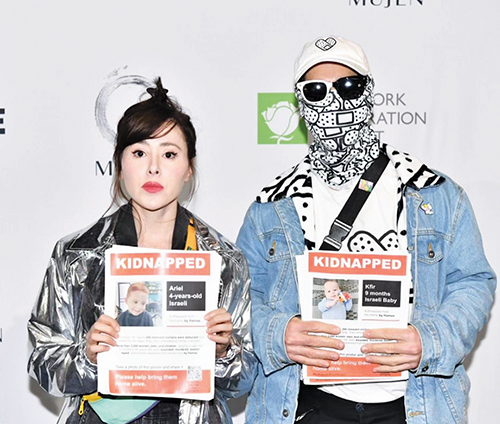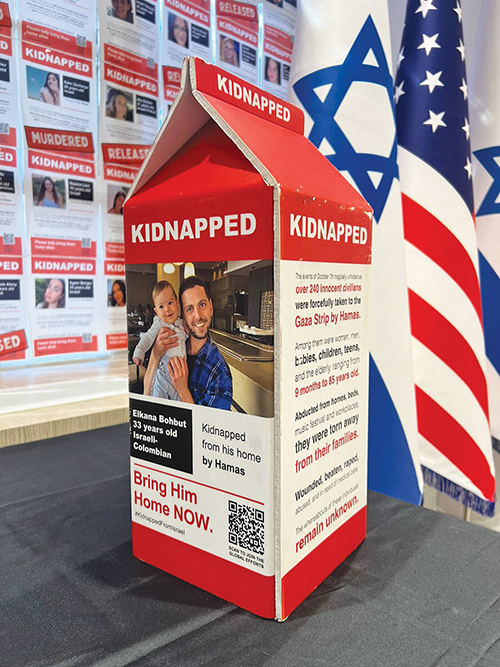
As of the writing of this article, it is day 84 of the Gaza War, which sadly does not seem to have any end in the near future. That unfortunately means it is also day 84 for the more than 100 innocent victims who are still being held hostage by the terrorist group Hamas.
By now, the iconic “kidnapped” posters depicting the original more than 240 innocent civilians abducted from Israel into the Gaza Strip by Hamas on October 7, 2023 have been seen in Israel, the United States and countries around the world. These posters, created by Israeli street artists and partners Dede Bandaid and Nitzan Mintz, have become the rallying cry and de facto images of the October 7 horrors and continuing hostage terror.
Dede Bandaid (his street name) and Nitzan Mintz (she has always signed her works with her name) are Tel Aviv-based artists. Dede (a family nickname) began displaying his works on the streets of Tel Aviv in 2006. Born in Tel Aviv-Yafo, he completed his undergraduate studies at Bezalel Academy of Art and Design. The urban artist’s work is well known for its widespread use of images of bandages.
Bandaid goes by this name because he dealt with trauma after the Intifada and the loss of some of his men during his military service. “I was looking for a way to communicate what I felt. I was looking for a symbol. Band Aids had different meanings and slowly I saw how powerful this symbol was. With each band-aid painted, I found this symbol could help many, many people,” he said. And with time, the artist healed himself.

And because for the longest time, starting after his military service, Bandaid painted giant bandages around the broken and falling-down parts of Tel Aviv buildings, the symbol of the Band Aid came to have an additional meaning. It became the street artist’s commentary on the need to fix the broken parts of the city. “The Band Aids changed the meanings of the places they were put on,” he said.
Bandaid wears a bandana covering his face when in public. This is his way of having people “know my art, not me. I prefer to be anonymous. I want people to approach my art from their own perspective.”
Mintz, born and raised in south Tel Aviv, describes herself as a visual poet/street poet. “This means an artist who works in a public space,” she explained. “I started writing poetry at 15 years old and from 15-17 years old, all writing was on walls.”
Mintz graduated from the department of fine art and the department of creative writing at Minshar College, Tel Aviv, and from the Helicon School of Creative Writing, Tel Aviv. Both she and Bandaid started creating pieces in the streets during their military service.
On September 1, 2023, the two arrived in New York City, having been accepted to a three-month art residency program. However, on October 7, they received notices from family about the war in Israel. Hamas also sent to the cell phones of Israelis photos of the murders and rapes that they had perpetrated in Israel, and Mintz heard about this. Just how horrific the events were and are, was represented by a message from her aunt. “My aunt in Israel told me not to return to Israel because we no longer had a country. ‘No, you cannot return, ever,’” Nitzan recalls.
This served as fuel for the artists to start thinking about what would soon become The Kidnapped From Israel Project. They wanted to do something for the hostages. “Maybe there was someone we could still save. We could do something in a public space. We started to look for references, such as the milk cartons from the ’70s and ’80s, the missing kids on milk cartons,” said Dede.
It took the couple 48 hours to come up with the idea and the design. The posters were created and designed by a small group of Israelis based in New York City. Mintz and Bandaid partnered with graphic designers Tal Huber and Shira Gershoni in creating the “kidnapped posters” as downloadable digital files.
Taking 2,000 copies of the posters, Mintz and Bandaid crossed Manhattan on foot, hanging their posters everywhere, “but, no one cared,” said Mintz. “We received cruel comments from people. ‘Why are you posting these? Those people are killed anyway.’ People did not want to know.”
“We were completely broken,” said Bandaid. “We had no friends to help us.”
However, posts on social media soon exploded and the two artists built their own website,
#KidnappedFromIsrael. In less than 48 hours the pair received photos from all over the world and had to translate their posters into 33 different languages. “When people put up posters, you feel like you have family. Our community cannot be silenced. We have to do something,” Mintz said.
Their campaign is unfunded and is now one of the most widespread public artworks in history, as it continues to spread.

There are people who tear the posters down, and Mintz questions who could do this. “What kind of a person would rip down this poster?” Yet Bandaid still recognizes a brighter side. “There are thousands of volunteers who made the project possible,” he noted.
Mintz and Bandaid have had to move to different apartments many, many times because of the “kidnapped” project, due to concerns for their security. But the pair persisted and about two months after the posters, they thought about art fairs. In Miami, they built 2-foot sculptures and then huge sculptures of the kidnapped victims, featuring their photos on “milk cartons,” placing them in the middle of the street. They also made mini versions, which they hope will be distributed to influencers, such as politicians.
What will they do next? Well, they are open to ideas.
What energizes Mintz to continue despite the obstacles they have faced? “I am so angry, like an atom bomb,” she said. “Seeing people’s hate of other people, that’s the biggest energy charger of my life.”
Artists 4 Israel, a nonprofit working to prevent the spread of anti-Israel bigotry through art, helps communities and people affected by terrorism and hate, may help provide future ideas and outlets for Mintz and Bandaid. The goal of Artists 4 Israel is “art over hate” and in Culver City, California, the nonprofit has already created a massive “kidnapped” poster of Israeli hostages that cannot be torn down.
“Artists 4 Israel and Combat Antisemitism Movement created the largest ‘kidnapped’ poster art installation in the world,” Craig Dershowitz, CEO, Artists 4 Israel told The Jewish Link. “The work measures 120 feet wide and 22 feet high and features posters of all remaining hostages four times the size of a traditional poster, with the words #BRINGTHEMHOMENOW and KIDNAPPED running across the whole 120 feet. The KIDNAPPED posters were put up in such a way that no one would ever be able to rip them off and, most shockingly, the posters at street level have been made with mirrors so that those passing by can see their reflections in the image and consider what they would do if that was them in the situation of the hostages,”
And in Brooklyn, Artists 4 Israel will be unveiling their first rooftop mural. “Artists 4 Israel is the first organization, on either side of the conflict, to make advocacy visible from the clouds, airplanes, helicopters, highways and skyscrapers,” Dershowitz said. He is asking for anyone with rooftop access that Artists 4 Israel can utilize to tell the world to “Bring Them Home Now” to please contact him.
For more information, contact [email protected].
You can get the milk cartons by emailing [email protected].
You can download the posters and support the Kidnapped From Israel project at https://www.kidnappedfromisrael.com.












